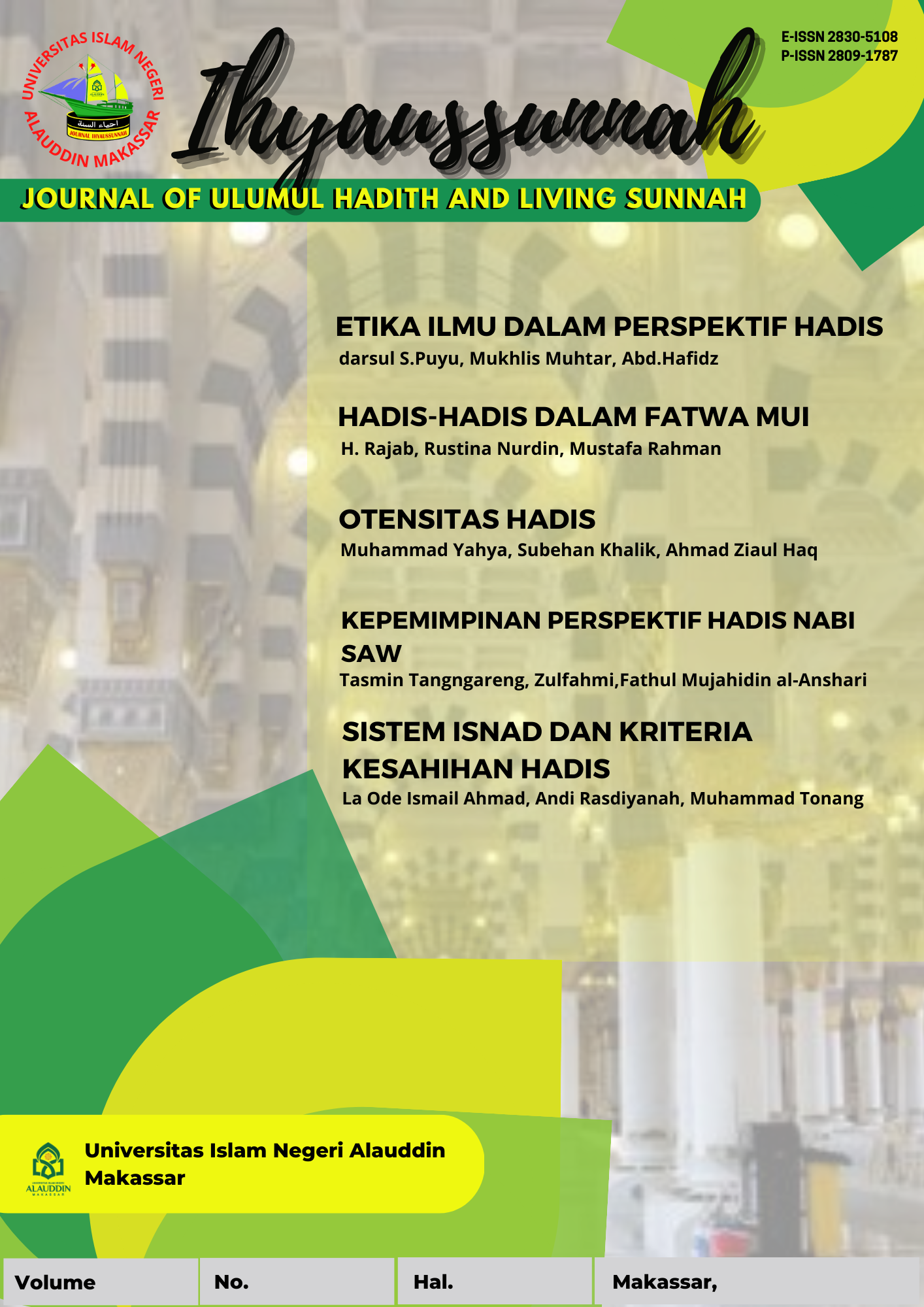Non-Muslims in The Nation-State: The Medina Charter as a Prototype for Islamic Wasathiyah Implementation in Indonesia
Abstract
In recent years, rampant intolerant cases have damaged Indonesia's religious image in various forms and waned national commitment. Starting with the refusal of non-Muslims to live in certain areas and the rejection of the establishment of houses of worship for certain religions, it is clear that religious freedom in Indonesia requires serious attention in order to implement wasathiyah values in Indonesia. This paper seeks to provide an understanding of non-Muslims in the nation-state, the Medina Charter as the Prophet's political strategy in realizing national commitment to become a model for the implementation of wasathiyah values in Indonesia. This paper uses a qualitative approach with data collection techniques through a literature study. The results of this study indicate that at least it can be understood that when the Prophet initiated the Medina Charter as a political policy and strategy in realizing national commitment, it could be used as a model for implementing wasathiyah values in Indonesia. The substance of the Medina Charter guarantees the social, political, religious, and cultural rights of the community to realize the unity and integrity of the nation, which is part of the national commitment that must be maintained and cared for properly. In addition, the values contained in the Medina Charter are the values taught in Islam and are in line with the spirit of national commitment in Indonesia. Therefore, the results of this research hopefully can contribute to rebuilding the spirit of togetherness and diversity in the Unitary Republic of Indonesia (NKRI)
Downloads
References
Abu Daud. Sunan Abu Daud,. Vol. III, Mesir: Dar Al-Hijr, 1999.
Abu Zahrah. Al-’Alaqah Al-Dauliyyah Fi Al-Islam. Kairo: Dar Al-Fikr Al-‘Arabi, 1995.
Al-Asfihani, Al-Raghib. Al-Mufradat Fi Gharib Al-Quran. Damaskus: Dar al-Qalam, 1412 AH.
Ba’alawi, Sayyid Abdurrahman. Bughyah Al-Murtasyidin fi Talkhish Fatawa Ba’dh Al-Aimmah Al-Mutaakhirin. Surabaya: Nurul Huda, n.d.
BBC News Indonesia, April 2019
Al-Buthi, Ramadhan. Al-Ghuluw wa al-Tatharruf. N.p.
_____, Al-Jihad Fi Al-Islam. Damaskus: Dar Al-Fikr, 1993.
Espositi, John L. Demokrasi di Negara-negara Muslim; Problem dan Prospek. Bandung: Mizan, 1999.
Fathi, Mohammed. Islam, Pluralisme dan Toleransi Keagamaan, translated by. Irfan Abubakar. Jakarta: Democracy Project, 2012.
Ghazali, Abdul Muqsith. Argumen Pluralisme Agama: Membangun Toleransi Berbasis al-Qur’an. Depok: KataKita, 2009.
Al-Hajjaj, Muslim. Sahih Muslim. Beirut: Dar Ihya Al-Turats Al-‘Arabi, 1991.
Al-Hambali, Muhammad bin Ahmad bin Salim. Ghida’ Al-Albab Syarh Mandzamah Al-Adab. Al-Maktabah Syamilah.
Ibnu Qayyim. Ahkam Ahl al-Dzimmah. Vol. III, Beirut: Dar Ibn Hazm, 1997.
_____, I’lam al-Muwaqqi’in. Beirut: Dar Al-Kutub Al-Ilmiyyah, 1991.
Ibnu Syarif, Mujar. Hak-Hak Politik Minoritas Non Muslim Dalam Komunitas Islam. Bandung: Angkasa, 2003.
Khalik, Subehan. Perlindungan Warga Negara Asing dalam Hukum Islam. Gowa: Alauddin University Press, 2021.
Litle, David, John Kelsay, Abdulaziz A. Sachedina. Kebebasan Agama dan Hak-Hak Asasi Manusia. Bandung: Pustaka Pelajar, 2005.
Al-Marikhi, Rasyid. Al-Hashad Li al-Ma’na Al-Shahih li Al-Jihad, Mafhumuhu wa Ahammiyatuhu min Manzhur al-Islam. Riyadh: Syirkah, 2007.
Noor, Juliansyah. Metodologi Penelitian. Jakarta: Kencana, 2011.
Qardawi, Yusuf. Ghair al-Muslimin fi al-Mujtama’ Al-Islami. n.p Maktabah Wahbah, n.d.
Sugiono, Memahami Penelitian Kualitatif. Bandung: Alfabeta, 2012.
Tim Bahtsul Masail, Fikih Kebangsaan Menebar Kerahmatan Islam. Kediri: Lirboyo Press, 2019.
Tim Forum Kajian Ilmiah AFKAR. Kritik Ideologi Radikal, Deradikalisasi Doktrin Keagamaan Ekstrim Dalam Upaya Meneguhkan Nilai-nilai Islam Berwawasan Kebangsaan. Kediri: Lirboyo Press, 2019.
Tohirin. Metode Penelitian Kualitatif. Jakarta: Raja Grafindo Persada, 2012.
Zuhaili, Wahbah. Al-Tafsir Al-Munir. Vol. XVI, Damaskus: Dar al-Fikr Al-Mu’ashir, 1418 AH.
_____, Atsar al-Harb Fi al-Fiqh Al-Islami. Damaskus: Dar Al-Fikr, 1998.
_____, Fiqh al-Islami wa Adillatuhu. Vol VIII. Damaskus: Dar Al-Fikr, n.d.
Copyright
Authors who publish with IHYAUSSUNNAH JOURNAL OF ULUMUL HADITH AND LIVING SUNAH agree to the following terms:
- Authors retain copyright and grant the journal right of first publication with the work simultaneously licensed under a Creative Commons Attribution License (CC BY-SA 4.0) that allows others to share the work with an acknowledgment of the work's authorship and initial publication in this journal.
- Authors are able to enter into separate, additional contractual arrangements for the non-exclusive distribution of the journal's published version of the work (e.g., post it to an institutional repository or publish it in a book), with an acknowledgment of its initial publication in this journal.
- Authors are permitted and encouraged to post their work online (e.g., in institutional repositories or on their website) prior to and during the submission process, as it can lead to productive exchanges, as well as earlier and greater citation of published work.


